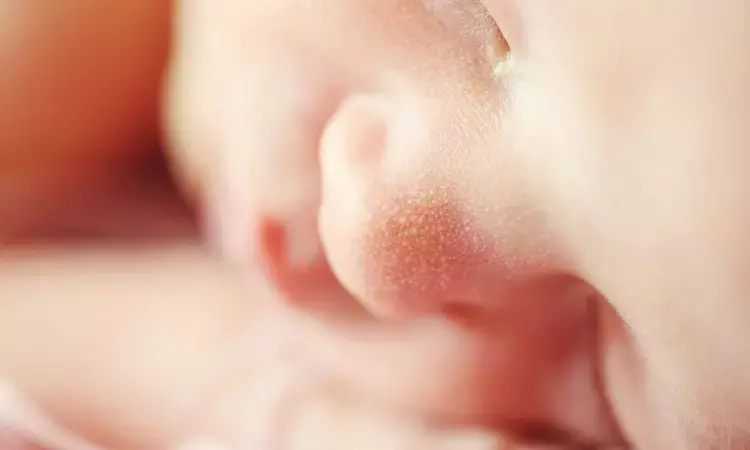- Home
- Medical news & Guidelines
- Anesthesiology
- Cardiology and CTVS
- Critical Care
- Dentistry
- Dermatology
- Diabetes and Endocrinology
- ENT
- Gastroenterology
- Medicine
- Nephrology
- Neurology
- Obstretics-Gynaecology
- Oncology
- Ophthalmology
- Orthopaedics
- Pediatrics-Neonatology
- Psychiatry
- Pulmonology
- Radiology
- Surgery
- Urology
- Laboratory Medicine
- Diet
- Nursing
- Paramedical
- Physiotherapy
- Health news
- Fact Check
- Bone Health Fact Check
- Brain Health Fact Check
- Cancer Related Fact Check
- Child Care Fact Check
- Dental and oral health fact check
- Diabetes and metabolic health fact check
- Diet and Nutrition Fact Check
- Eye and ENT Care Fact Check
- Fitness fact check
- Gut health fact check
- Heart health fact check
- Kidney health fact check
- Medical education fact check
- Men's health fact check
- Respiratory fact check
- Skin and hair care fact check
- Vaccine and Immunization fact check
- Women's health fact check
- AYUSH
- State News
- Andaman and Nicobar Islands
- Andhra Pradesh
- Arunachal Pradesh
- Assam
- Bihar
- Chandigarh
- Chattisgarh
- Dadra and Nagar Haveli
- Daman and Diu
- Delhi
- Goa
- Gujarat
- Haryana
- Himachal Pradesh
- Jammu & Kashmir
- Jharkhand
- Karnataka
- Kerala
- Ladakh
- Lakshadweep
- Madhya Pradesh
- Maharashtra
- Manipur
- Meghalaya
- Mizoram
- Nagaland
- Odisha
- Puducherry
- Punjab
- Rajasthan
- Sikkim
- Tamil Nadu
- Telangana
- Tripura
- Uttar Pradesh
- Uttrakhand
- West Bengal
- Medical Education
- Industry
Paternal preconception HBV infection increase congenital heart disease risk in offspring: JAMA

.This retrospective cohort study analyzed data from March 2023 to February 2024 where the primary exposure was paternal preconception HBV infection status, which included uninfected, hepatitis B envelope antigen negative, and previous infection, both serum hepatitis B surface antigen, and fresh infection. Maternal HBV immune status was additionally classified as immune or susceptible. Male participants whose wives were aged 20 to 49 years, were not infected with HBV, and successfully conceived within 1 year after prepregnancy examination were included. The primary result was CHDs, which were gathered via the NFPCP birth defect registration card.
A total of 6,675,540 couples in all took part in the NFPCP service and 3,047,924 couples were recruited in the trial after spouses with and without preconception HBV infection were matched in a 1:4 ratio. 0.025% of the children born to these spouses had CHDs. A prior paternal HBV infection was independently linked to CHDs in children when compared to no infection. The subgroup analysis based on maternal HBV immunity status yielded comparable results.
Couples with previously HBV-infected husbands had a similar risk of CHDs in their offspring when compared to couples with susceptible wives and uninfected husbands. This risk was similar for couples with susceptible wives and for couples with immune-compliant wives. The couples with newly infected men and immune wives had a substantially greater risk of CHD in their kids. However, there was no difference in risk between those couples and susceptible wives. The immunological state of the mother and the paternal HBV infection did not interact, it was discovered. Overall, this study shows that there may be a link between the likelihood of congenital heart defects in kids and prior paternal preconception HBV infection, which may harm sperm and embryo development.
Source:
Yang, Y., Liu, M., Han, J., Wu, H., Zhao, C., Lyu, X., Hu, X., Liu, Y., Xu, D., Xie, W., Huang, J., Wu, S., Li, J., Lei, J., Zhang, Y., Zhang, H., He, Y., Peng, Z., Wang, Y., … Ma, X. (2024). Paternal Preconception Hepatitis B Virus Infection and Risk of Congenital Heart Disease in Offspring. In JAMA Pediatrics. American Medical Association (AMA). https://doi.org/10.1001/jamapediatrics.2024.2680
Neuroscience Masters graduate
Jacinthlyn Sylvia, a Neuroscience Master's graduate from Chennai has worked extensively in deciphering the neurobiology of cognition and motor control in aging. She also has spread-out exposure to Neurosurgery from her Bachelor’s. She is currently involved in active Neuro-Oncology research. She is an upcoming neuroscientist with a fiery passion for writing. Her news cover at Medical Dialogues feature recent discoveries and updates from the healthcare and biomedical research fields. She can be reached at editorial@medicaldialogues.in
Dr Kamal Kant Kohli-MBBS, DTCD- a chest specialist with more than 30 years of practice and a flair for writing clinical articles, Dr Kamal Kant Kohli joined Medical Dialogues as a Chief Editor of Medical News. Besides writing articles, as an editor, he proofreads and verifies all the medical content published on Medical Dialogues including those coming from journals, studies,medical conferences,guidelines etc. Email: drkohli@medicaldialogues.in. Contact no. 011-43720751


